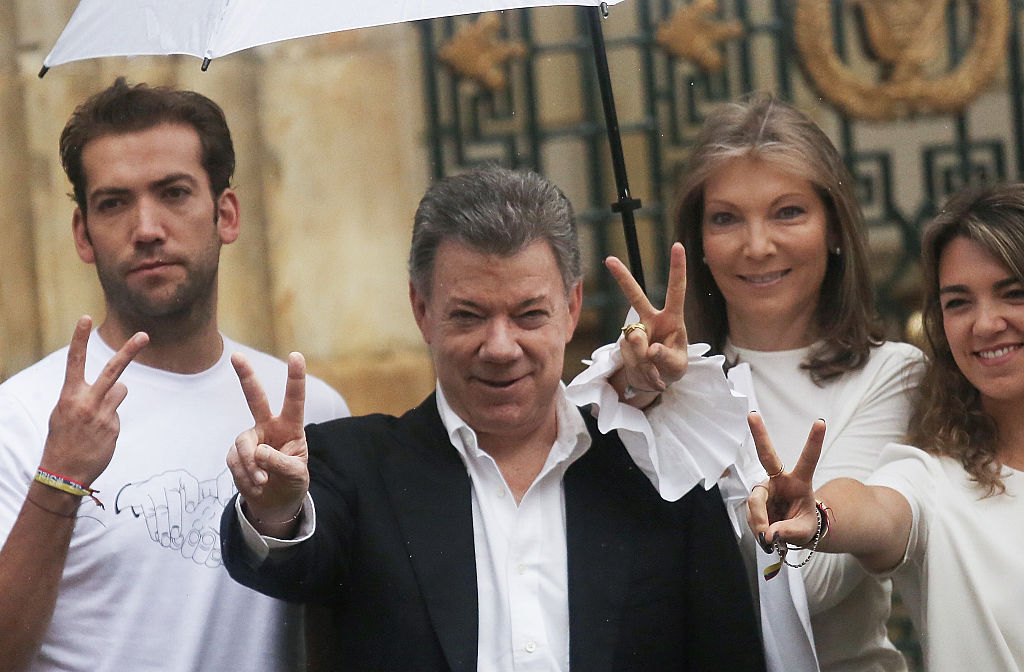Colombian President Juan Manuel Santos awarded 2016 Nobel Peace Prize


A free daily email with the biggest news stories of the day – and the best features from TheWeek.com
You are now subscribed
Your newsletter sign-up was successful
On Friday, the Norwegian Nobel Committee awarded Colombian President Juan Manuel Santos "for his resolute efforts to bring the country's more than 50-year-long civil war to an end." Santos put the peace accord with the FARC guerrilla group up to a popular vote, and in a shocking upset, the voters narrowly rejected the deal. "The outcome of the vote was not what President Santos wanted," the Nobel Committee said, but the result "does not necessarily mean that the peace process is dead." Santos "has brought the bloody conflict significantly closer to a peaceful solution," the committee said, and his "endeavors to promote peace thus fulfill the criteria and spirit of Alfred Nobel's will."
"By awarding this year's Peace Prize to President Juan Manuel Santos, the Norwegian Nobel Committee wishes to encourage all those who are striving to achieve peace, reconciliation, and justice in Colombia," the Norwegian Nobel Committee said. "The Committee hopes that the Peace Prize will give him strength to succeed in this demanding task." Santos is the second Colombian to win a Nobel; Gabriel García Márquez won the Nobel Prize in Literature in 1982.
The Peace Prize is the most anticipated Nobel, and there is always a lot of speculation and second-guessing about the selected laureate. In announcing the prize, the committee said it never comments on those it did not pick, in response to a question about why FARC leaders were not included in the prize. One of the popular favorites to win this year's Peace Prize were the White Helmets, or Syrian defense forces, who grace the cover of this week's Time magazine. They were collectively graceful in being passed over. Peter Weber
The Week
Escape your echo chamber. Get the facts behind the news, plus analysis from multiple perspectives.

Sign up for The Week's Free Newsletters
From our morning news briefing to a weekly Good News Newsletter, get the best of The Week delivered directly to your inbox.
From our morning news briefing to a weekly Good News Newsletter, get the best of The Week delivered directly to your inbox.
A free daily email with the biggest news stories of the day – and the best features from TheWeek.com
Peter has worked as a news and culture writer and editor at The Week since the site's launch in 2008. He covers politics, world affairs, religion and cultural currents. His journalism career began as a copy editor at a financial newswire and has included editorial positions at The New York Times Magazine, Facts on File, and Oregon State University.
-
 Switzerland could vote to cap its population
Switzerland could vote to cap its populationUnder the Radar Swiss People’s Party proposes referendum on radical anti-immigration measure to limit residents to 10 million
-
 Political cartoons for February 15
Political cartoons for February 15Cartoons Sunday's political cartoons include political ventriloquism, Europe in the middle, and more
-
 The broken water companies failing England and Wales
The broken water companies failing England and WalesExplainer With rising bills, deteriorating river health and a lack of investment, regulators face an uphill battle to stabilise the industry
-
 Blue Origin launches Mars probes in NASA debut
Blue Origin launches Mars probes in NASA debutSpeed Read The New Glenn rocket is carrying small twin spacecraft toward Mars as part of NASA’s Escapade mission
-
 Dinosaurs were thriving before asteroid, study finds
Dinosaurs were thriving before asteroid, study findsSpeed Read The dinosaurs would not have gone extinct if not for the asteroid
-
 SpaceX breaks Starship losing streak in 10th test
SpaceX breaks Starship losing streak in 10th testspeed read The Starship rocket's test flight was largely successful, deploying eight dummy satellites during its hour in space
-
 Rabbits with 'horns' sighted across Colorado
Rabbits with 'horns' sighted across Coloradospeed read These creatures are infected with the 'mostly harmless' Shope papilloma virus
-
 Lithium shows promise in Alzheimer's study
Lithium shows promise in Alzheimer's studySpeed Read Potential new treatments could use small amounts of the common metal
-
 Scientists discover cause of massive sea star die-off
Scientists discover cause of massive sea star die-offSpeed Read A bacteria related to cholera has been found responsible for the deaths of more than 5 billion sea stars
-
 'Thriving' ecosystem found 30,000 feet undersea
'Thriving' ecosystem found 30,000 feet underseaSpeed Read Researchers discovered communities of creatures living in frigid, pitch-black waters under high pressure
-
 New York plans first nuclear plant in 36 years
New York plans first nuclear plant in 36 yearsSpeed Read The plant, to be constructed somewhere in upstate New York, will produce enough energy to power a million homes
